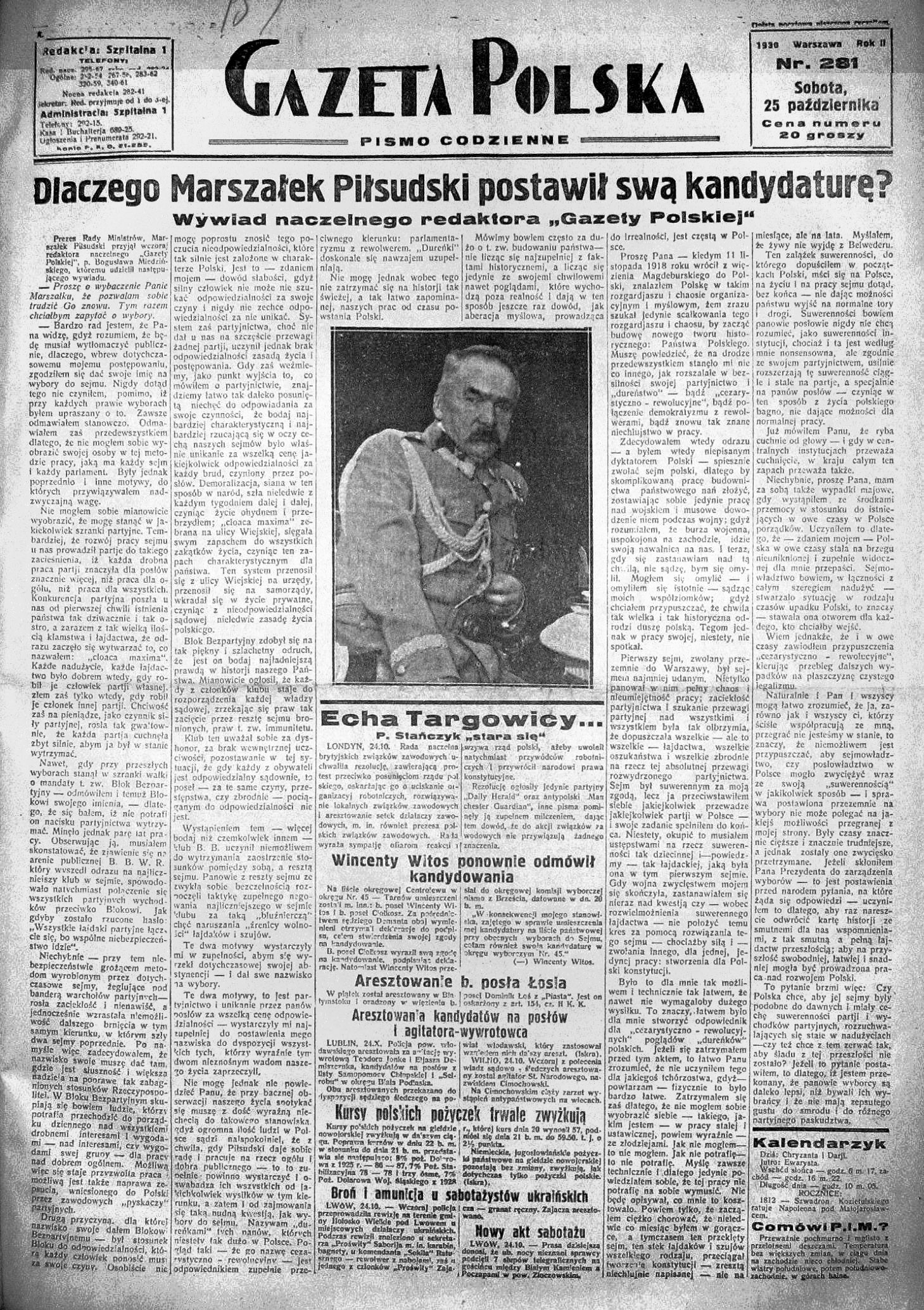Gazeta Polska (1929–1939) on:
[Wikipedia]
[Google]
[Amazon]
 ''Gazeta Polska'' was an important
''Gazeta Polska'' was an important
 ''Gazeta Polska'' was an important
''Gazeta Polska'' was an important newspaper
A newspaper is a periodical publication containing written information about current events and is often typed in black ink with a white or gray background.
Newspapers can cover a wide variety of fields such as politics, business, spor ...
in the interwar Poland
The Second Polish Republic, at the time officially known as the Republic of Poland, was a country in Central and Eastern Europe that existed between 1918 and 1939. The state was established on 6 November 1918, before the end of the First World ...
, published from 1929 to 1939 in Warsaw
Warsaw ( pl, Warszawa, ), officially the Capital City of Warsaw,, abbreviation: ''m.st. Warszawa'' is the capital and largest city of Poland. The metropolis stands on the River Vistula in east-central Poland, and its population is officiall ...
. It had a strong pro-Sanation
Sanation ( pl, Sanacja, ) was a Polish political movement that was created in the interwar period, prior to Józef Piłsudski's May 1926 ''Coup d'État'', and came to power in the wake of that coup. In 1928 its political activists would go on ...
bias and was seen as a semi-official news outlet of the Sanation-dominated Polish government of the second half of the 1930s. Within Sanation politics, ''Gazeta Polska'' supported " the colonels" and later, Edward Rydz-Śmigły
Marshal Edward Rydz-Śmigły (11 March 1886 – 2 December 1941; nom de guerre ''Śmigły, Tarłowski, Adam Zawisza''), also called Edward Śmigły-Rydz, was a Polish politician, statesman, Marshal of Poland and Commander-in-Chief of Poland ...
. It often voiced calls for more authoritarian government and for harsher treatment of the opposition.
The newspaper's circulation grew from 15,000 in the early 1930s to 30,000 in the latter part of the decade. The paper was closed in the aftermath of the German invasion of Poland
The invasion of Poland (1 September – 6 October 1939) was a joint attack on the Republic of Poland by Nazi Germany and the Soviet Union which marked the beginning of World War II. The German invasion began on 1 September 1939, one week afte ...
, along with most other Polish newspapers. The newspaper was reactivated in 1941 in Palestine by Kański and was the most popular Polish newspaper in the Middle East
The Middle East ( ar, الشرق الأوسط, ISO 233: ) is a geopolitical region commonly encompassing Arabian Peninsula, Arabia (including the Arabian Peninsula and Bahrain), Anatolia, Asia Minor (Asian part of Turkey except Hatay Pro ...
until 1947.
Editorial board
Its successive editors-in-chief wereAdam Koc
Adam Ignacy Koc (31 August 1891 – 3 February 1969) was a Polish politician, MP, soldier, journalist and Freemason. Koc, who had several ''noms de guerre'' (Witold, Szlachetny, Adam Krajewski, Adam Warmiński and Witold Warmiński), fought ...
(1929–1931), Bogusław Miedziński (1931–1938) and Mieczysław Starzyński (1938–1939). Journalist
A journalist is an individual that collects/gathers information in form of text, audio, or pictures, processes them into a news-worthy form, and disseminates it to the public. The act or process mainly done by the journalist is called journalis ...
s associated with the newspaper included Juliusz Kaden-Bandrowski
Juliusz Kaden-Bandrowski (24 February 1885 in Rzeszów – 8 August 1944 in Warsaw) was a Polish journalist and novelist. Between 1933–1939 he was a secretary general of the prestigious Polish Academy of Literature (''Polska Akademia Litera ...
and Kazimierz Wierzyński
Kazimierz Wierzyński (Drohobycz, Kingdom of Galicia and Lodomeria, 27 August 1894 – 13 February 1969, London) was a Polish poet and journalist; an elected member of the prestigious Polish Academy of Literature in the Second Polish Repu ...
. In his correspondence, Winston Churchill
Sir Winston Leonard Spencer Churchill (30 November 187424 January 1965) was a British statesman, soldier, and writer who served as Prime Minister of the United Kingdom twice, from 1940 to 1945 during the Second World War, and again from ...
criticized the paper for becoming one of the victims of the 1934 German–Polish Press Agreement, which prohibited the publication of material that might be "prejudicial to good relations between the two countries."
References
{{DEFAULTSORT:Gazeta Polska (1929-1939) 1929 establishments in Poland 1939 disestablishments in Poland Defunct newspapers published in Poland Newspapers published in Warsaw Polish-language newspapers Publications established in 1929 Publications disestablished in 1939 Second Polish Republic